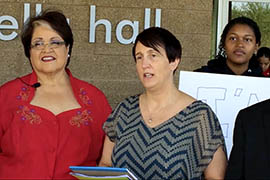Cronkite News has moved to a new home at cronkitenews.azpbs.org. Use this site to search archives from 2011 to May 2015. You can search the new site for current stories.
Advocates out to get ‘young invincibles’ familiar with health exchange
AVONDALE – Young people who fall into a gap between their parents’ health insurance plans and coverage through employers need to get information on how the federal exchange now open in Arizona can protect them should they face major health problems, advocates said Monday.
“We know that young people really do care about health insurance; they’ve just lacked access and lacked affordable options,” said Erin Hemlin, national organizing and programs manager for the Young Invincibles, a nonprofit group that advocates for young adults.
Her group and Arizona PIRG came to Estrella Mountain Community College here to launch a campaign to reach the estimated one in four Arizonans ages 18 to 34 who are eligible for the exchange that opened Oct. 1.
Health Insurance 101 Campus Blitz Week will visit campuses in the Valley and Tucson.
“The more people we get insured, the more people that are going to doctors’ offices instead of waiting until they need to go to the emergency room,” Hemlin said.
Her group estimates that under the Affordable Care Act 149,000 Arizonans ages 18 to 34 could qualify for the state’s Medicaid expansion in 2014, while 131,000 could be eligible for tax credits in the health insurance marketplace.
Diane Brown, executive director for the Arizona PIRG Education Fund, said many young adults have expressed intrigue about and interest in the health exchange but would benefit from more information.
“Our message to young adults is: Know your health insurance options,” she said.
Avondale Mayor Marie Lopez Rogers, who attended the news conference, said health insurance isn’t something that young people may have on their list of priorities.
“Young people need health care coverage because it is essential to their economic security,” she said. “If a person gets sick or injured and doesn’t have health insurance, the hospital or doctor bills can quickly exceed their ability to pay them.”
Herb Schultz, regional director for the U.S. Department of Health and Human Services, said that no one should be one illness or medical condition away from financial ruin.
“This not only brings peace of mind and security, but it brings young adults the ability to start their careers, start their lives, without the concern that they could be financially ruined by some sort of health event,” he said.
Randall Fields, a 23-year-old student at Estrella Mountain Community College, said he once had to pay thousands of dollars for treatment of pneumonia when he was denied coverage by Arizona’s Medicaid system.
“Now students like me can be less worried about their health insurance and more worried about academics,” he said.







